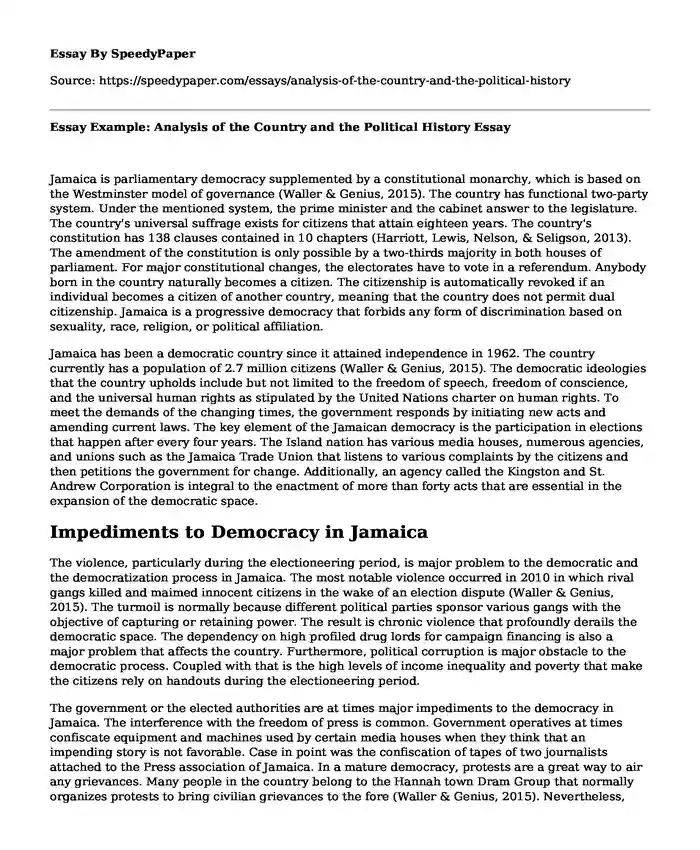Jamaica is parliamentary democracy supplemented by a constitutional monarchy, which is based on the Westminster model of governance (Waller & Genius, 2015). The country has functional two-party system. Under the mentioned system, the prime minister and the cabinet answer to the legislature. The country's universal suffrage exists for citizens that attain eighteen years. The country's constitution has 138 clauses contained in 10 chapters (Harriott, Lewis, Nelson, & Seligson, 2013). The amendment of the constitution is only possible by a two-thirds majority in both houses of parliament. For major constitutional changes, the electorates have to vote in a referendum. Anybody born in the country naturally becomes a citizen. The citizenship is automatically revoked if an individual becomes a citizen of another country, meaning that the country does not permit dual citizenship. Jamaica is a progressive democracy that forbids any form of discrimination based on sexuality, race, religion, or political affiliation.
Jamaica has been a democratic country since it attained independence in 1962. The country currently has a population of 2.7 million citizens (Waller & Genius, 2015). The democratic ideologies that the country upholds include but not limited to the freedom of speech, freedom of conscience, and the universal human rights as stipulated by the United Nations charter on human rights. To meet the demands of the changing times, the government responds by initiating new acts and amending current laws. The key element of the Jamaican democracy is the participation in elections that happen after every four years. The Island nation has various media houses, numerous agencies, and unions such as the Jamaica Trade Union that listens to various complaints by the citizens and then petitions the government for change. Additionally, an agency called the Kingston and St. Andrew Corporation is integral to the enactment of more than forty acts that are essential in the expansion of the democratic space.
Impediments to Democracy in Jamaica
The violence, particularly during the electioneering period, is major problem to the democratic and the democratization process in Jamaica. The most notable violence occurred in 2010 in which rival gangs killed and maimed innocent citizens in the wake of an election dispute (Waller & Genius, 2015). The turmoil is normally because different political parties sponsor various gangs with the objective of capturing or retaining power. The result is chronic violence that profoundly derails the democratic space. The dependency on high profiled drug lords for campaign financing is also a major problem that affects the country. Furthermore, political corruption is major obstacle to the democratic process. Coupled with that is the high levels of income inequality and poverty that make the citizens rely on handouts during the electioneering period.
The government or the elected authorities are at times major impediments to the democracy in Jamaica. The interference with the freedom of press is common. Government operatives at times confiscate equipment and machines used by certain media houses when they think that an impending story is not favorable. Case in point was the confiscation of tapes of two journalists attached to the Press association of Jamaica. In a mature democracy, protests are a great way to air any grievances. Many people in the country belong to the Hannah town Dram Group that normally organizes protests to bring civilian grievances to the fore (Waller & Genius, 2015). Nevertheless, most protests normally turn violent. In extreme cases, the violence leads to loss of civilian lives.
Conclusion
As demonstrated, Jamaica is a constitutional democracy that guarantees certain fundamental rights and freedoms to the citizens. The vibrant media, elections, and the freedoms spelt under the constitution make the set the country on an impressive path to democratization. However, certain factors such as violence during the electioneering period, political corruption, and income inequality derail the gains made by the application of democracy. It is imperative to note that in the wake of the various democratic and governance loopholes identified, the country needs change aimed at strengthening and developing its institutions for proper application of democratic principles.
References
Harriott, A. A., Lewis, B. A., Nelson, K. V., & Seligson, M. (2013). The Political Culture of Democracy in Jamaica and in the Americas, 2012: Towards Equality of Opportunity. Retrieved from https://www.vanderbilt.edu/lapop/jamaica/Jamaica_Country_Report_2012_W.pdf
Waller, L., & Genius, A. (2015). Barriers to transforming government in Jamaica: challenges to implementing initiatives to enhance the efficiency, effectiveness, and service delivery of government through ICTs (e-Government). Transforming Government: People, Process, and Policy, 9(4), 480-497. Retrieved from https://www.emeraldinsight.com/doi/abs/10.1108/TG-12-2014-0067
Cite this page
Essay Example: Analysis of the Country and the Political History. (2023, Jan 10). Retrieved from https://speedypaper.net/essays/analysis-of-the-country-and-the-political-history
Request Removal
If you are the original author of this essay and no longer wish to have it published on the SpeedyPaper website, please click below to request its removal:
- Marcus Garvey Essay Example
- Free Essay on the Article, Tragedy of the Commons by Garrett Hardin
- Biblical Worldview Essay Example for Free
- Free Paper about Managing Bias in Decision-Making - Personality Assessment
- Literary Essay Sample: Irony in "The Story of an Hour" by Kate Chopin
- Paper Example: The Federal Emergency Management Agency
- Globalization's Contradictions: Unraveling the Impact on National Sovereignty and Perspectives on Economic Shifts
Popular categories





